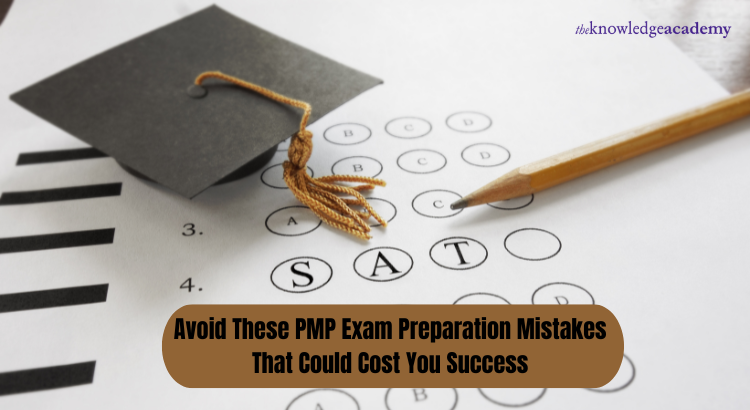Many dedicated project managers put in study hours only to fall short on exam day. The difference between passing and failing often comes down to avoiding simple mistakes during your PMP Certification journey. It is not just about how much you study but how smart your PMP Exam Prep is. Overlooking key areas, poor planning or last-minute cramming can undo months of hard work.
In this blog, we highlight the common preparation mistakes that could cost you success and show you how to avoid them to stay on track for exam victory.
Table of Contents
- PMP Exam Preparation Mistakes You Cannot Afford to Make
- Conclusion
PMP Exam Preparation Mistakes You Cannot Afford to Make
Even the most dedicated candidates can stumble if they overlook these simple but critical mistakes during their PMP exam prep. Below are the common mistakes that could prevent you from passing the PMP exam:
Skipping the PMP Exam Content Outline
Ignoring the official PMP exam subject outline is a crucial error, even though it is simple to become excited and delve right into study materials. This overview tells you exactly what areas the test will test, so it’s more than just a recommendation. Without it, you risk wasting time and preparing for the PMP exam in the incorrect way. Examining this paper immediately gives you a clear road map and helps you concentrate on what is important. Successful applicants use the outline as a guide for their preparation.
Relying Only on the PMBOK Guide
Many applicants think that passing the test only requires knowing the PMBOK Guide. Despite being a vital resource, the PMP exam covers more than just concepts and procedures. It tests your ability to apply ideas in practical contexts. You may not be ready for scenario-based questions if you only use one book for your PMP test preparation. Combining the PMBOK Guide with additional study resources, including online courses, interactive conversations, and mock examinations, is the most effective strategy. This combination guarantees a deeper comprehension and improved exam readiness.
Underestimating the Importance of Practice Exams
Practice tests teach you how to think as the PMP exam requires, so they’re more than just a knowledge test. If you skip them, you’ll lose out on learning important skills like time management and answering difficult questions under pressure. Frequent practice enables you to discover your weaknesses early and make necessary adjustments to your PMP exam preparation before it’s too late. Consider each practice test as an educational experience rather than a test result. It is among the best strategies to increase accuracy and confidence.
Cramming at the Last Minute
Many people regret not starting their preparation until the last few days before the test. Understanding is rewarded in the PMP exam, not memorisation. Stress, poor memory, and thoughtless mistakes result from last-minute cramming. Your brain has more time to take in and digest information when you follow a consistent, well-paced study schedule. You can review material, solidify your understanding, and lessen your worry by distributing your PMP exam preparation over several weeks. Long-term success is always achieved through consistency rather than cramming.
Ignoring Agile and Hybrid Approaches
As the PMP test has changed, so too should your study methods. There are gaps in your expertise if you solely concentrate on conventional project management techniques. The exam now includes a sizable section on agile and hybrid techniques. You run the danger of being caught off guard on exam day if you ignore these areas. A balanced study of all approaches should be a part of your PMP exam preparation. To cover the entire exam, it is essential to comprehend Agile principles and how they work with hybrid models.
Not Having a Study Plan
It would be similar to beginning a project without a timeline to approach your preparation without a formal plan. It results in uneven development, hurried rewriting, and missed themes. Having a well-defined study plan aids in maintaining organisation, monitoring progress, and efficiently allocating your time. Because you can observe consistent progress, it also maintains motivation. Setting reasonable objectives, allocating daily time, and routinely assessing progress are the first steps to successful PMP exam preparation. A well-thought-out approach breaks down difficult material into digestible steps.
Conclusion
Avoiding these common mistakes can turn your PMP certification journey from stressful to successful. With smart planning and the right approach to PMP exam prep, passing becomes much more achievable. To boost your chances, consider expert-led guidance from The Knowledge Academy, where you will find comprehensive resources designed to support your success.










